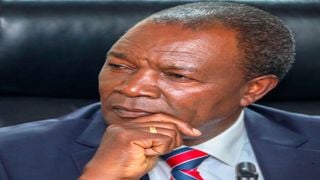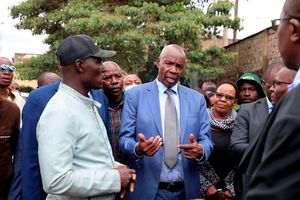
Cabinet Secretary, National Treasury & Economic Planning Njuguna Ndung'u on May 17, 2023.
| File | Nation Media GroupBusiness
Premium
Treasury cuts development, inflates budget by Sh187bn
President William Ruto’s administration has cut development expenditure but increased its maiden budget by Sh187.3 billion in an effort to confront economic headwinds related to missed tax targets, huge debt repayment obligations and spending pressures from critical sectors such as education and health.
Treasury Cabinet Secretary Njuguna Ndung’u on Thursday tabled his third mini-budget in which he slashed development spending by Sh41.96 billion.
Development spending relates to costs incurred to create assets that will provide long-term public goods such as roads and hospitals.
The government initially allocated Sh807.6 billion to development expenditure in the budget tabled in June.
But this allocation has now been reduced to Sh765.7 billion as the Treasury pumps more money into running the government.
Roads infrastructure, whose allocation has been slashed by Sh20.7 billion, is the hardest hit in the latest budgetary changes that have raised total spending for the current financial year to Sh3.93 trillion from the initial estimate of Sh3.74 trillion.
In the last decade, road construction has been the main driver of Kenya’s huge appetite for borrowing, explaining why it has been the biggest casualty of Kenya Kwanza’s austerity measures aimed at reducing the country’s debt levels.
Affordable housing, Dr Ruto’s pet project, is also a casualty of the latest changes, with the State Department for Housing & Urban Development losing Sh13.3 billion.
However, the Consolidated Fund Services (CFS), a big chunk of which comprises interest payments, has increased by Sh145.5 billion, pointing to mounting pressure on debt repayments due to higher interest rates and the weakening of the Shilling.
Spending items under the CFS include pension, salaries for State officers and commissions as well as net lending.
Recurrent expenditure, a big portion of which includes wages, administrative expenses, increased by Sh83.75 billion
Education—including fresh capitation for junior secondary, Higher Education Loans Board (HELB), the New Funding Model for the Technical, Vocational and Education (TVET) and University Scholarships—has received an additional Sh62.1 billion.
Prof Ndung’u said the Financial Year 2023/24 Supplementary Budget seeks to settle carryovers and pending bills for the previous fiscal years and allocate resources to new emergencies.
Additionally, the supplementary budget also seeks to make funds available to cater for shortfalls in wages and salaries and regularise approved reallocations that had not been authorised by the National Assembly.
“In addition, other interventions comprise; security operations-related interventions, fertiliser subsidy, purchase of food reserve, settlement of debts owed to sugar and coffee farmers, crop post-harvest loss management, drought-related interventions, salary adjustments, changes in development partners-funded projects among others,” said Prof Ndung’u.
In the latest supplementary budget, the target for tax revenue remains unchanged, signalling that the government is not that bullish about an increase in economic activities in the next 12 months.
The increase in revenue is largely due to fees and commissions received by various State corporations, including college fees.
This is the first budget since Dr Ruto came to power last year, promising to stimulate the economy by empowering the millions of Kenyans at the bottom of the pyramid such as jua kali artisans, mama mboga and boda boda operators.
“I promise to throw open every door of opportunity and to keep them open until success stories become the norm rather than the exception and urge all other leaders to do the same, so that we can together expand opportunity and chance for many more,” said Dr Ruto in his inauguration speech in September last year.
However, Dr Ruto’s economic plan of uplifting the poor has faced headwinds, including massive debt obligations that have forced his administration to introduce far-reaching tax measures.
But tax revenues have been underperforming, with the Kenya Revenue Authority (KRA) missing its target for first quarter by Sh79 billion.
Some of the major tax changes that the Ruto administration has implemented include the doubling of the value added tax (VAT) on fuel from 8.0 percent to the standard rate of 16 percent.
The government also introduced a mandatory a 1.5 percent housing levy on the gross monthly salary of workers, to be matched by employers.
A tough economic environment that has been aggravated by drought, disruption of the global supply chains due to the war in Ukraine, and a weak shilling have put a strain on consumers’ purchasing power.
The Kenyan economy expanded by 5.4 percent between April and June this year, growing at a faster pace than the 5.2 percent growth rate posted at the same time last year, boosted by a pick-up in agricultural activities due to favourable weather.
The agriculture sector, which had been depressed by drought, expanded by 7.7 percent, the fastest pace since 2020, from a contraction of 2.4 percent in 2022.





